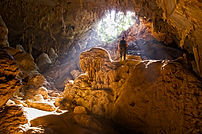

GMRS Community Links
Helpful Links
The Las Vegas Sphere might have an impressive spec sheet, but its energy demands are almost as staggering.
Las Vegas is a city known for its commitment to the excesses of human consumption. Here, you can gamble away your life savings, drink yourself silly in its many over-priced bars, and generally live out your high-roller fantasies in the middle of the scorchingly hot and dry Nevada desert.
Now Nvidia has revealed that the displays of the now-iconic Las Vegas Sphere—a gigantic spherical entertainment arena sitting at the heart of Sin City—are powered by 150 of its RTX A6000 desktop workstation GPUs.
For those that like big numbers, well, hold onto your hats. Each of those GPUs feature over 10,752 cores, 48 GB of memory and have a 300 W TDP, for a grand total of 1,612,800 cores, 7,200 GB of GDDR6 memory, and a potential maximum power draw of 45,000 W at full tilt (via Wccftech). And that's just the beginning of the staggering figures. Those GPUs power 16 internal displays, each with a resolution of 16K, alongside 1.2 million programmable LED pucks coating the exterior of the sphere. Content is streamed from an outside facility using Nvidia BlueField DPUs and ConnectX-6 DX NICs via Nvidia's Rivermax media streaming software, which ensures everything stays in sync across all those screens.
All of that hardware comes at a cost. Beyond the $2.3 billion spent on its construction, it's estimated that the Sphere is capable of drawing 28,000,000 watts of power. For reference, 1,000,000 watts, or 1 megawatt, is said to be enough to satisfy the instantaneous demand of 750 homes at once in the California/Nevada area, meaning that 28 megawatts would be equivalent to the power necessary for 21,000 homes.
Currently, an agreement is under review to ensure that 70% of the Sphere's power needs will come from solar sources, with the other 30% from non-renewable energy that will be offset by renewable energy credits. Nevada has pledged to achieve net zero emissions of greenhouse gases by 2050, and the solar project under construction to help offset its energy debt is estimated to complete in 2027.
In the meantime, the Sphere sits as a gigantic monument to the excesses of modern technology taken to an extreme. While the sheer technical achievement here is impressive, I can think of few things more indicative of the current state of sustainability in tech more than a gigantic screen in the middle of a city devoted to excess—in the middle of the desert—blasting advertisements and entertainment media, while long-term renewable energy solutions to power it are still under development.
Still, pretty though, aint it?

GMRS Community Links
Helpful Links
CHECK THIS OUT!
Las Vegas' dystopia-sphere, powered by 150 Nvidia GPUs and drawing up to 28,000,000 watts, is both a testament to the hubris of humanity and an admittedly impressive technical feat.
By Andy Edser
published July 11, 2024
The Las Vegas Sphere might have an impressive spec sheet, but its energy demands are almost as staggering.
Las Vegas is a city known for its commitment to the excesses of human consumption. Here, you can gamble away your life savings, drink yourself silly in its many over-priced bars, and generally live out your high-roller fantasies in the middle of the scorchingly hot and dry Nevada desert.
Now Nvidia has revealed that the displays of the now-iconic Las Vegas Sphere—a gigantic spherical entertainment arena sitting at the heart of Sin City—are powered by 150 of its RTX A6000 desktop workstation GPUs.
For those that like big numbers, well, hold onto your hats. Each of those GPUs feature over 10,752 cores, 48 GB of memory and have a 300 W TDP, for a grand total of 1,612,800 cores, 7,200 GB of GDDR6 memory, and a potential maximum power draw of 45,000 W at full tilt (via Wccftech). And that's just the beginning of the staggering figures. Those GPUs power 16 internal displays, each with a resolution of 16K, alongside 1.2 million programmable LED pucks coating the exterior of the sphere. Content is streamed from an outside facility using Nvidia BlueField DPUs and ConnectX-6 DX NICs via Nvidia's Rivermax media streaming software, which ensures everything stays in sync across all those screens.
All of that hardware comes at a cost. Beyond the $2.3 billion spent on its construction, it's estimated that the Sphere is capable of drawing 28,000,000 watts of power. For reference, 1,000,000 watts, or 1 megawatt, is said to be enough to satisfy the instantaneous demand of 750 homes at once in the California/Nevada area, meaning that 28 megawatts would be equivalent to the power necessary for 21,000 homes.
Currently, an agreement is under review to ensure that 70% of the Sphere's power needs will come from solar sources, with the other 30% from non-renewable energy that will be offset by renewable energy credits. Nevada has pledged to achieve net zero emissions of greenhouse gases by 2050, and the solar project under construction to help offset its energy debt is estimated to complete in 2027.
In the meantime, the Sphere sits as a gigantic monument to the excesses of modern technology taken to an extreme. While the sheer technical achievement here is impressive, I can think of few things more indicative of the current state of sustainability in tech more than a gigantic screen in the middle of a city devoted to excess—in the middle of the desert—blasting advertisements and entertainment media, while long-term renewable energy solutions to power it are still under development.
Still, pretty though, aint it?